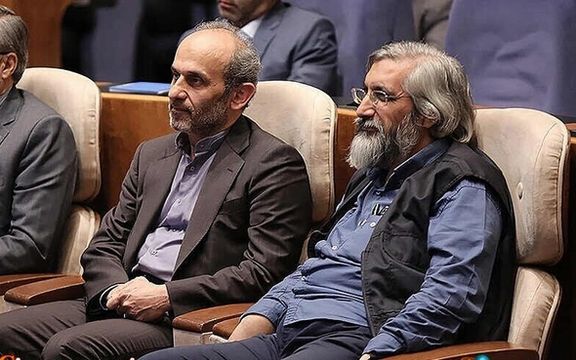Related Articles
The type of fire and smoke confirms that the explosive material was a derivative of sodium, and that a container is by no means a suitable vessel for storing sodium perchlorate, as the heat inside a container cannot be controlled, Farzin Nadimi, a senior defense and security analyst at the Washington Institute, told Iran International.
He said it did not appear that the containers were refrigerated, and the rise in temperature could have been one of the factors triggering the reaction and fire.
“If someone wanted to cause such a reaction leading to a fire, it would be very easy to set off an explosion in such a shipment. It did not seem that there were any serious security measures in place beyond surveillance cameras," Nadimi said regarding the possibility of an act of sabotage.
According to the analyst, either a person or an aerial device could have been responsible.
Nadimi added: “In the video, we did not see anything hitting the container from the sky, but on the ground, a very small and simple explosive device could have triggered the initial fire.”
Resolving the wide-ranging disputes between the United States and Iran will require days of intensive negotiations, political analyst and journalist Omid Memarian told Iran International on Sunday.
Memarian said Iran seeks the full removal of US oil and banking sanctions, but Washington has conditioned any lifting of sanctions on Tehran’s cooperation with the International Atomic Energy Agency (IAEA) — a demand the Islamic Republic has so far resisted.
"Verification and access by the IAEA to Iran’s nuclear activities remain major points of contention," Memariansaid, adding that while US officials are pressing for more comprehensive inspections, Iranian authorities continue to impose restrictions on the agency's monitoring efforts.
Iran’s state broadcaster, Islamic Republic of Iran Broadcasting (IRIB), is facing accusations of undermining the government’s diplomatic efforts with the United States, according to an analysis by KhabarOnline published on Sunday.
As indirect negotiations between Tehran and Washington continue under the authorization of Supreme Leader Ali Khamenei, KhabarOnline said IRIB and its reporters have increasingly aired false claims and anti-diplomacy narratives, challenging the official diplomatic line pursued by President Masoud Pezeshkian’s administration.
The analysis argues that since the election of the current government, the broadcaster has become a platform for opponents, using its platform to act against government decisions. This includes allegedly hosting critics of the US talks and disseminating unsubstantiated details of the discussions.
The analysis specifically mentions a state TV expert who reportedly drew a parallel between the Iran-US talks and the Northern Ireland peace process, suggesting the negotiations could lead to social divisions and even civil conflict in Iran.
KhabarOnline attributed the opposition within IRIB to figures close to Iran’s so-called hardline "shadow government," identifying Peyman Jebelli, the head of IRIB, and Vahid Jalili, brother of senior conservative politician Saeed Jalili, as key figures shaping the network’s editorial stance against the government.

The color of the smoke from the first explosion at Rajaei port in Bandar Abbas suggests the presence of a large amount of sodium, defense and security analyst Farzin Nadimi told Iran International.
"The color of the smoke from the first explosion is completely yellow, which indicates the presence of a large amount of sodium in the blast," Nadimi said.
"Sodium is the main material used to produce sodium perchlorate — the same chemical that was unloaded at Bandar Abbas in February and March this year. This chemical, imported from China, is combined with ammonium chloride to produce ammonium perchlorate, which is used in the production of solid missile fuel," he added.
The explosion at Shahid Rajaei port on Saturday likely involved missile fuel rather than ordinary chemical materials, aerospace expert Adrian Fazaeli said in an interview with Iran International.
"This type of material does not explode under normal conditions with just heat or air," Fazaeli said. "They need an initial detonation to ignite and explode."
Fazaeli said the intensity of the explosion, the mushroom-shaped cloud, and the color of the smoke all pointed to the presence of aluminum compounds used in missile fuel. "The white smoke we saw is very similar to the burning of missile fuel, which contains aluminum and oxidizers," he said.
He added that the timing of the explosion coincided with the unloading of fuel reportedly purchased from China, and this made it unlikely that the incident was caused by industrial negligence.
"The chance that this was a safety issue is very, very low," Fazaeli said. "Especially since Iran’s domestic solid fuel mixers were destroyed recently, and Iran had to buy ready-made fuel likely from China."
Fazaili said the circumstances suggest the materials involved were military-grade, intended for Iran’s missile program.
